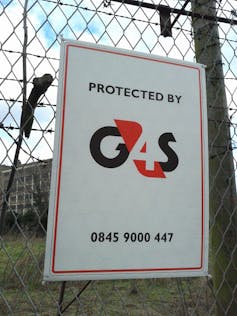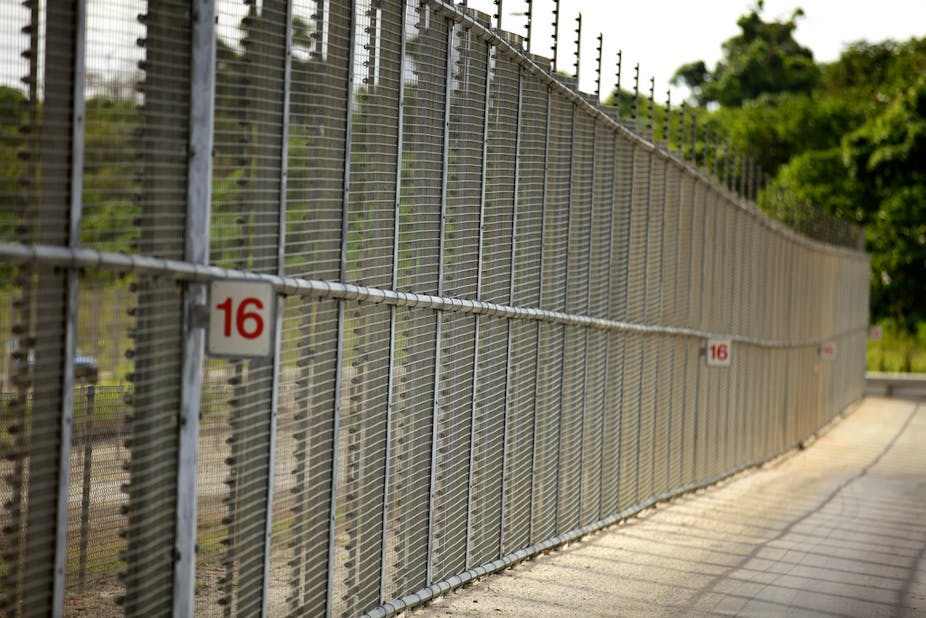The awarding of a A$1.22 billion contract to Transfield Services to run the Manus Island and Nauru detention centres is yet another example of a government handing over responsibility to other parties for what have long been core activities of the state.
A decreasing number of very large, for-profit firms, sometimes housed in tax havens, are picking up more and more complex, politically sensitive services on behalf of government, including everything from courthouse security, prisons and para-military services to the more recent detention centre services.
Big global contractors have emerged in these markets. G4S, which up until recently had held the contract for services on Manus Island, operates in 125 countries, employs some 625,000 people and delivers a range of services to governments across the world. According to its website these range from patient transport in Victoria to patrolling the US-Mexico border, to running the world’s second largest private prison in South Africa.
The AusTender database shows that Transfield Services has (or does) provide the Australian government with a range of services from floor coverings, to the operation and maintenance of a detention centre in Nauru (valued at over $3.2M for just over one year).
Its competitor Serco provides everything from prisons in New Zealand to court and custodial services in Australia, but has also drawn down substantial amounts of government funds through delivering onshore detention centres. According to the Hansard copy of the Senate Legal and Constitutional Affairs Legislation Estimates Committee between 2009-2014 the detention centre contracts awarded to Serco were worth A$2.14 billion and immigration housing was worth $195.4 million (page 89).
Lessons from the US
The concentration of the firms providing such services in the US was highlighted in the Commission on Wartime Contracting report, released in 2011. It estimated that more than US$200 billion had been spent on contracts and grants in the Iraq and Afghanistan wars, with the top 22 contractors sharing almost US$140 billion (2002-2011) of that. As a result, the report found the US government had been placed in a very risky and costly position for many contingency-support functions.
In his in-depth article from the New York Times in 2011, Nick Bernstein took us into the world of large and growing multinationals that have turned the immigration crackdown, as he called it, into a burgeoning business opportunity. Australia, he argued was leading the international pack in handing over operational aspects of its ever more complex immigration policies to external parties. CEOs of major outsourcing firms cited by Bernstein openly discussed the market for justice, the business opportunities from political crisis, and the dwindling levels of competition in areas of ever-increasing demand.
Muddying the waters
The situation in Australia is complicated by successive governments seeing fit to outsource their immigration problems not only to large for-profit security companies, but to other nations. This not only confuses the boundaries, but makes accountability and responsibility for various parts of this operation ambiguous.
Despite the commercial contracts between the Commonwealth and G4S, the Minister for Immigration and Border Protection, Scott Morrison, stated in his press conference on February 21:
Under arrangements made by the former government, control and management of the centre is placed within the PNG government, consistent with their sovereign responsibility.
He also noted that the current government fully endorsed this approach. Under intense questioning during Senate Estimates, however, it was made clear that the Department, via its contract, can exercise influence over who is employed in the centres (page 71). The mixed messages and complex arrangements provide the potential for confusion in practice; just who is really in charge?
Getting the contract ‘right’
In appointing Transfield Services, the minister explained he was seeking a more “integrated approach” to offshore processing. In practice this consolidates substantial operations with Transfield Services, increasing its market power. Part of the driver for this, according to the minister, was to address what seem to be issues of quality of service with the multinational provider G4S:
… one of the things we thought we needed offshore, and that has clearly been borne out I think by recent events, is … a more integrated contract management and system in process (sic) that was operating across both islands.
The previous government, he claimed, had taken a “fairly ad-hoc approach to these contractual arrangements”. Such fast and loose contracting, therefore, must be able to be solved by cleaning up the arrangements; and these factors look to have influenced the announcement in December that the G4S contract would not be renewed.
Under questioning in Senate Estimates, however, the Secretary of the Department Martin Bowles indicated the transition from G4S to Transfield Services had nothing to do with performance, and more to do with the “synergies” to be gained from having one contractor across multiple locations (page 55). Although on further questioning Bowles noted that Transfield Services has not been delivering “welfare” services on Nauru, a range of activities that were previously provided by the Salvation Army on Manus Island, so this was not just an expansion of existing services, but work for which they had never tendered for on either site (pages 86-87).
This line of argument takes us down the track of thinking that getting the contract “right” will help prevent such problems in the future.
Asked in a press conference how the safety of asylum seekers could be guaranteed, Scott Morrison argued it could be done:
Through the safety standards and the contracts of lawful conduct … by providers and I think the strong management of our people who are supporting the PNG government.

The contract for services on Manus Island between G4S and the Commonwealth of Australia, released under an FOI request and published online by New Matilda, shows it was largely specified as a collection of cleaning, gardening and security services wrapped up with plenty of rhetoric on collaboration, “transferee” health, wellbeing and dignity, with much detail to be worked out later (e.g. performance frameworks).
While activities such as cleaning, security and gardening are part and parcel of providing detention services, is this really it? Can government really specify here what it wants to buy? And can it construct accountability mechanisms and measures we should be demanding in these extraordinarily sensitive areas of government activity?
Not your average contract
In theory at least, the power of a contract comes from the ability of the purchaser, in this case government, to enforce standards, sue for breach, extract damages, and punish contractors who fail to deliver.
In practice though, just how willing are governments to actually do this, and do they have the necessary resources and skills to follow through?
When we combine the power of the contract with intense competition in provider markets, governments should be big winners with lower prices and higher quality. In reality, the situation is much more complicated with profound challenges in specifying services, either an unwillingness or inability of purchasers to wield a big stick, and highly contorted supplier markets in some areas. As Bernstein argued in his piece, it’s remarkably rare for firms in the “market for justice” to lose their contracts.
In our work we have found that the most complex and potentially risky areas of outsourcing are inevitably in situations where the government hands over its monopoly on legal force to external parties or involves them in sensitive areas, points stressed in the US Commission on Wartime Contracting report.
There are three different types of benefits and costs for government to weigh up when making a decision to outsource.
The first is value for money - difficult to analyse in the Manus Island case given the mixed messages that came out of Senate Estimates about synergies, streamlining and efficiencies on the one hand, but the suggestion of higher costs of processing offshore compared to onshore (page 88). The second is relationships. In the case of Manus Island this is muddied by the political relationships between the Australian and PNG governments that are bundled in with the broader service delivery story.
Then there are the strategic costs and benefits - reputation effects, loss of core competencies, and the inability to control the situation. Even if we knew that there were value for money and relational benefits in the case of Manus Island (and we don’t), the strategic costs accruing to the Australian government in this case are profound politically, ethically and morally.
Creating multi-billion dollar contracts with large multinational firms for the handling of asylum seekers is not only strategically risky for government, it has surely pushed us over the edge of our tolerance for outsourcing.

